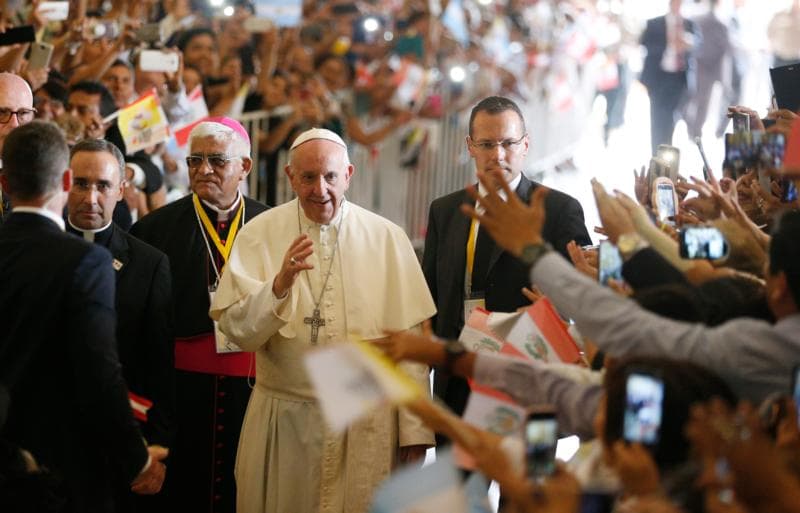ROME – As the Catholic Church in different countries begins various synodal processes, the conference of Latin American bishops could not stay behind, and has launched its own Ecclesial Assembly.
“Did you know that our Latin American church is calling together the 377 million Catholics in 46 countries of the continent to discern a joint pastoral plan?” reads the header of an invitation to the presentation of the initiative in Chile, which took place on Thursday. “The idea is to open ways to respond as a Church to the current social, health, political, economic, ecological and ecclesial crisis.”
“Pope Francis asks all the People of God (not only the bishops) to make their voices heard in the ‘Listening Process’ of the First Ecclesial Assembly,” the invitation continues.
In May 2019, during an assembly of bishops from all over the continent, the new presidency of the conference of Catholic bishops of Latin America and the Caribbean (CELAM) was asked to send a request to Pope Francis to summon the bishops to a new general conference of the episcopate. The such meeting one was in 2007 in Aparecida, Brazil.
This type of assembly is unique to Latin America, and no other continental conference of Catholic bishops has done anything similar.
The 2007 assembly was attended by some 200 bishops who met for 20 days, sharing concerns and drawing up a document that is still guiding the Church in Latin America. Yet when the CELAM leadership brought the initiative to the pope, he argued that there are many things from Aparecida that were never applied, and advised them to hold a meeting of the people of God instead, to strengthen the guidelines that were set out in 2007.
Hence, the idea for an Ecclesial Assembly involving not only bishops, but also priests, religious, men and women religious, deacons, and laymen and women.
There have been similar assemblies at a diocesan level, but thus far, according to CELAM, this is the first one at a continental level.
The “Listening Process” was technically launched earlier this month at a continental level, but each local church has put together its own plan, mostly to be carried out through online platforms due to COVID-19 restrictions.
The Ecclesial Assembly, in addition to further living out the spirit of Aparecida, is also looking forward to two important anniversaries in 2031 and 2033. The first date makes reference to the Jubilee Year of Our Lady of Guadalupe in the 500th anniversary of her apparitions, and the second to the 2,000 anniversary of Christ’s resurrection.
Throughout the first year of his pontificate, particularly when welcoming leaders from his home continent, Pope Francis gave them the final text from Aparecida, which he was tasked with drafting when he was still known as Cardinal Jorge Mario Bergoglio.
The Ecclesial Assembly will have two stages, beginning with the listening process. Then, thousands of representatives of the Latin American Church will – if the pandemic allows – gather in Mexico City in November, to further discuss the topics presented in the preparatory document, available online in Spanish and Portuguese.
“As missionary disciples, gathered in synodality in the 1st Ecclesial Assembly of Latin America and the Caribbean, we will remember what happened in the Fifth General Conference in Aparecida, and looking contemplatively at our reality with its challenges, we will rekindle our pastoral commitment so that, in Jesus Christ, our peoples may have a full life in and through the new paths towards 2031 and 2033,” says the assembly’s website.
This listening process is meant to serve as a moment discernment for those who will gather in November, and it’s hoped that it will guide the future steps of the regional Church so that it can “accompany Jesus incarnated today among the people, in their sensus fidei which is their sense of faith.”
The listening process will take place between April and July of this year, and lay people are invited to both pay attention to the call from the national bishops conferences to participate, or to request to be heard if no such initiative is announced.
Through a video message, Archbishop Eduardo Eliseo Martin, of Rosario, Argentina, encouraged people throughout Latin America to actively participate in the Assembly: “The Church wants to listen to all the laity, to all the faithful, to the greatest number, to be able to evaluate through all of you which is the path we have to follow.”
The listening process takes a similar methodology than that carried out by the Vatican’s Synod of Bishops under Pope Francis, where through different ministries or individually, people are invited to answer a questionnaire and share their reflections on several issues affecting the Church.
The list of possibilities is long and varied, and include the COVID-19 pandemic as a sign of epochal change; the environment; violence; migrations; the increase in the number of people who declare themselves agnostic, non-believers or atheists; the growth of Evangelical and Pentecostal churches in the continent; the new challenges of the family and its different realities; the full participation of young people in society and in the Church; the prevention of clerical sexual abuse; and clericalism.
Follow Inés San Martín on Twitter: @inesanma















